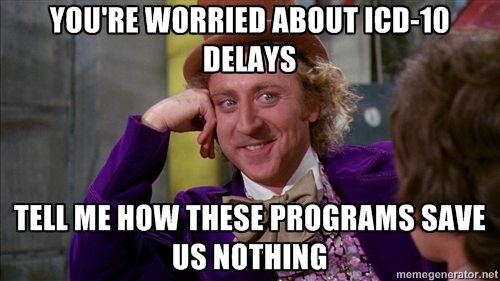Congress is now going to vote to delay the ICD-10 implementation date.
The bill that’s before Congress would delay the compliance date for ICD-10 until 2015, and it has led to at least one prominent healthcare association opposing it.
The main focus of the legislation — “Protecting Access to Medicare Act of 2014” — is to extend Medicare payments to physicians as well as a host of other Medicare and Medicare programs impacted by the Sustainable Growth Rate (SGR). So far, Congress has attempted to but has been unable to repeal this part of the law.
Section 212, however, includes important language concerning the transition to ICD-10 that has not appeared in previous attempts at repealing the SGR.
According to an announcement by the American Health Information Management Association (AHIMA), the bill is slated to be voted by the House of Representatives on March 27.
And how cool is this? As if we didn’t already know that ICD-10 was a congressional business stratgem, check out this sycophantic letter that AHIMA sent to its members:
Hello Representative XX/Senator XX, my name is XXX and I am a concerned member in your district, as well as a healthcare professional. I am calling to voice my opposition to the language in the SGR patch that would delay ICD-10 implementation until October, 2015. CMS estimates that a 1 year delay could cost between $1 billion to $6.6 billion. This is approximately 10-30% of what has already been invested by providers, payers, vendors and academic programs in your district. Without ICD-10, the return on investment in EHRs and health data exchange will be greatly diminished… I urge you, Representative XX/ Senator XX to oppose the ICD-10 delay and let Speaker Boehner and Senate Majority Leader Reid know that a delay in ICD-10 will substantially increase total implementation costs in your district as well as delay the positive impact for patient care.
How about those bold statements? Sound more like EMR and ICD-10 supporters are desperately hyping up the red tape so they can turn a quick buck. The fact is, RAND Corporation has already studied EMRs’ alleged savings, and found they were entirely fabricated. And as for saving time, tell that to Dr. Kevin Pho and his 50 clicks to nowhere.
